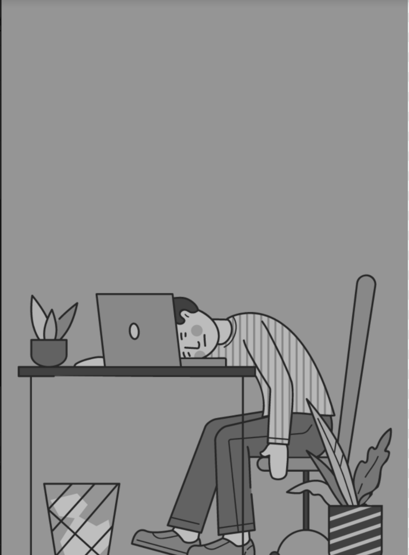We often come across articles on how to increase productivity, but did you know about the habits that seem harmless but negatively affect your motivation?
1. Sitting for the whole day
We all have that coworker who never gets up from their chair at work. At first glance, it seems like those people are more productive and work-oriented than the rest of us. In reality, this assumption is far from the truth.
In the 2016 International Journal of Behavioral Nutrition and Physical Activity, a study was published exploring the impact of active breaks during work on motivation, mood, and snacking. The test group was divided into three. One group had to sit for the whole work period, the second did some exercise before work, and the third took a couple of walking activities for five minutes during the work period. The results? The third group was more energetic and seldom thought about having snacks compared to the first group. They also had a better mood and motivation compared to the second group.
Focusing on work is necessary. We even have a separate article on time management. But, this doesn’t mean that you have to spend the whole day at your table. Physical activity helps you stimulate your body and mind.
2. Multitasking
For long, I believed that doing many things at once meant accomplishing more in a short amount of time. Through time I realized that I was jumping from task to task without really finishing any one of them. My doubts were finally validated by the study done at the University of Utah:
As it turned out, only 2% of people can multitask efficiently. The reason for such a low percentage is the fact that their brains have a different neural structure than the rest of ours. In other words, they’re physically different, and multitasking often won’t likely make you any better at it.
It’s highly unlikely that all of us fall into that 2%. A better strategy would be not to even think about other tasks until you finish the one you’re currently working on. Focus on how many tasks you completed during the day or a week, not how many you started.
3. Perfectionism
“You can always edit a bad page. You can't edit a blank page.” – Jodi Picoult, American writer.
This is another habit affecting our productivity negatively. Before we start to work on something, the image of it in our heads is ideal. But as soon as we begin to bring it to life, we notice the defects that weren’t there in our heads. For perfectionists, this translates to terrible work. Often, the fear of an imperfect article, illustration, or any other type of project stops us from working on it. In other cases, it causes dissatisfaction with ourselves and gradually decreases our motivation.
A good way to solve this problem is the 70% rule. The idea is as follows: Imagine the best-case scenario of your workday. Then, aim for 70% of that. If you reach that target, then you can safely assume that the day has gone successfully.
Most progress accounting models work on the same principle, such as the OKR system, which is effectively used by Google and other leading companies. OKR system implies making a long-term strategy that is made up of short-term measurable goals. We’ll devote a separate article to this topic, but what’s interesting now is that every goal’s target outcome is set at 60-70%. This means that you put your highest ambitions on the board, but you don’t beat yourself up for not reaching them. And, there’s always room for improvement, so your motivation never decreases.
4. Accepting every offer
We see new challenges, opportunities, and requests arising around us all the time. Examples of this are endless: A friend is working on a new project and asks you for help; there’s an exciting internship that popped out of nowhere; they’re offering you a one-time project, but you have a force major at your full-time job…
Often it is hard to reject tempting offers, which really just stresses you out even more. Especially when everyone is preaching that we shouldn’t miss out on new opportunities.
Trying out new things is always exciting and intriguing, and helping out friends always puts you in a better mood. But, accepting every offer or request isn’t always as good as it seems.
Saying “NO” is a more critical skill than saying “YES.” Carefully evaluate every offer you get and only then make your final decision. You can even write down pros and cons, just to make it easier.
5. Meetings
From all of the offers that would rather have been rejected, meetings seem to be the least harmless. Even more, companies usually see this as of utmost necessity. In reality, most part of the meetings is devoted to aimless discussions and too much strategizing. This is the time when no one is doing any work on the project at hand.
Don’t be afraid to reject a meeting when you have something more valuable scheduled for the day. And if you are organizing a meeting, make sure that there is a need for it and have a clear outline of the topics needed to be discussed. Remember, this is the time of your employees you’re taking away from them here.
6. Leaving important work as the last task
It always seems more appealing to start the day with easy tasks. You reassure yourself that you’ll do this one last tiny thing and free up the rest of the evening for the big stuff. Then the evening arrives, and you suddenly realize that you’re tired and demotivated. This is a classic example of procrastination. Our energy runs out as we go through with our day, and we’re left with important work that still needs to be done.
This problem is so common that there’s even a book about it called “Eat that frog”. The title of the book comes from Mark Twain’s words:
“Eat a live frog first thing in the morning, and nothing worse will happen to you the rest of the day.”
The idea of this saying (and of the whole book) is that you have to spend the mornings doing your most important work, and the rest of the day will go smoothly and with much more enthusiasm.
Also read: Why do we procrastinate and how to stop doing it.
7. Checking notifications
No list of bad habits is finished without this point. Social media is definitely one of the main distractions of today, and I know you’ve heard this many times before.
Checking employer/employee notifications all too often and having the need to reply to all of them at once creates an illusion of productivity. In reality, everything is the other way around. You lose your focus and feel a lot more stressed, as if you don’t have enough time to manage everything coming your way. We’re often disturbed by our colleagues with something that has nothing to do with what we’re currently working on, and while we jump on to that topic seemingly harmlessly, we’re leaving our task unfulfilled in the end. But, the reality is that we don’t have to and shouldn’t change the course of our daily schedule (unless it’s an emergency), and we don’t have to reply to everyone instantly.
Log out of social media and explain to your colleagues that they can call you instead, and only if something urgent comes up. Otherwise, you’ll always find yourself scrolling Facebook and chatting with your friends instead of focusing on what needs to be done.
Nowadays, getting focused on work and sticking to the schedule has become a lot harder than ever. And that makes these qualities a lot more rewarding, too. The more focused you are during your workday, the better results you get and the more time you are left to spend with your family and friends. When it comes to startuppers’ lives, this is not only good but necessary as well.




7 ‘harmless’ habits that destroy productivity
17 November 2020We often come across articles on how to increase productivity, but did you know about the habits that seem harmless but negatively affect your motivation?
1. Sitting for the whole day
We all have that coworker who never gets up from their chair at work. At first glance, it seems like those people are more productive and work-oriented than the rest of us. In reality, this assumption is far from the truth.
In the 2016 International Journal of Behavioral Nutrition and Physical Activity, a study was published exploring the impact of active breaks during work on motivation, mood, and snacking. The test group was divided into three. One group had to sit for the whole work period, the second did some exercise before work, and the third took a couple of walking activities for five minutes during the work period. The results? The third group was more energetic and seldom thought about having snacks compared to the first group. They also had a better mood and motivation compared to the second group.
Focusing on work is necessary. We even have a separate article on time management. But, this doesn’t mean that you have to spend the whole day at your table. Physical activity helps you stimulate your body and mind.
2. Multitasking
For long, I believed that doing many things at once meant accomplishing more in a short amount of time. Through time I realized that I was jumping from task to task without really finishing any one of them. My doubts were finally validated by the study done at the University of Utah:
As it turned out, only 2% of people can multitask efficiently. The reason for such a low percentage is the fact that their brains have a different neural structure than the rest of ours. In other words, they’re physically different, and multitasking often won’t likely make you any better at it.
It’s highly unlikely that all of us fall into that 2%. A better strategy would be not to even think about other tasks until you finish the one you’re currently working on. Focus on how many tasks you completed during the day or a week, not how many you started.
3. Perfectionism
“You can always edit a bad page. You can't edit a blank page.” – Jodi Picoult, American writer.
This is another habit affecting our productivity negatively. Before we start to work on something, the image of it in our heads is ideal. But as soon as we begin to bring it to life, we notice the defects that weren’t there in our heads. For perfectionists, this translates to terrible work. Often, the fear of an imperfect article, illustration, or any other type of project stops us from working on it. In other cases, it causes dissatisfaction with ourselves and gradually decreases our motivation.
A good way to solve this problem is the 70% rule. The idea is as follows: Imagine the best-case scenario of your workday. Then, aim for 70% of that. If you reach that target, then you can safely assume that the day has gone successfully.
Most progress accounting models work on the same principle, such as the OKR system, which is effectively used by Google and other leading companies. OKR system implies making a long-term strategy that is made up of short-term measurable goals. We’ll devote a separate article to this topic, but what’s interesting now is that every goal’s target outcome is set at 60-70%. This means that you put your highest ambitions on the board, but you don’t beat yourself up for not reaching them. And, there’s always room for improvement, so your motivation never decreases.
4. Accepting every offer
We see new challenges, opportunities, and requests arising around us all the time. Examples of this are endless: A friend is working on a new project and asks you for help; there’s an exciting internship that popped out of nowhere; they’re offering you a one-time project, but you have a force major at your full-time job…
Often it is hard to reject tempting offers, which really just stresses you out even more. Especially when everyone is preaching that we shouldn’t miss out on new opportunities.
Trying out new things is always exciting and intriguing, and helping out friends always puts you in a better mood. But, accepting every offer or request isn’t always as good as it seems.
Saying “NO” is a more critical skill than saying “YES.” Carefully evaluate every offer you get and only then make your final decision. You can even write down pros and cons, just to make it easier.
5. Meetings
From all of the offers that would rather have been rejected, meetings seem to be the least harmless. Even more, companies usually see this as of utmost necessity. In reality, most part of the meetings is devoted to aimless discussions and too much strategizing. This is the time when no one is doing any work on the project at hand.
Don’t be afraid to reject a meeting when you have something more valuable scheduled for the day. And if you are organizing a meeting, make sure that there is a need for it and have a clear outline of the topics needed to be discussed. Remember, this is the time of your employees you’re taking away from them here.
6. Leaving important work as the last task
It always seems more appealing to start the day with easy tasks. You reassure yourself that you’ll do this one last tiny thing and free up the rest of the evening for the big stuff. Then the evening arrives, and you suddenly realize that you’re tired and demotivated. This is a classic example of procrastination. Our energy runs out as we go through with our day, and we’re left with important work that still needs to be done.
This problem is so common that there’s even a book about it called “Eat that frog”. The title of the book comes from Mark Twain’s words:
“Eat a live frog first thing in the morning, and nothing worse will happen to you the rest of the day.”
The idea of this saying (and of the whole book) is that you have to spend the mornings doing your most important work, and the rest of the day will go smoothly and with much more enthusiasm.
Also read: Why do we procrastinate and how to stop doing it.
7. Checking notifications
No list of bad habits is finished without this point. Social media is definitely one of the main distractions of today, and I know you’ve heard this many times before.
Checking employer/employee notifications all too often and having the need to reply to all of them at once creates an illusion of productivity. In reality, everything is the other way around. You lose your focus and feel a lot more stressed, as if you don’t have enough time to manage everything coming your way. We’re often disturbed by our colleagues with something that has nothing to do with what we’re currently working on, and while we jump on to that topic seemingly harmlessly, we’re leaving our task unfulfilled in the end. But, the reality is that we don’t have to and shouldn’t change the course of our daily schedule (unless it’s an emergency), and we don’t have to reply to everyone instantly.
Log out of social media and explain to your colleagues that they can call you instead, and only if something urgent comes up. Otherwise, you’ll always find yourself scrolling Facebook and chatting with your friends instead of focusing on what needs to be done.
Nowadays, getting focused on work and sticking to the schedule has become a lot harder than ever. And that makes these qualities a lot more rewarding, too. The more focused you are during your workday, the better results you get and the more time you are left to spend with your family and friends. When it comes to startuppers’ lives, this is not only good but necessary as well.